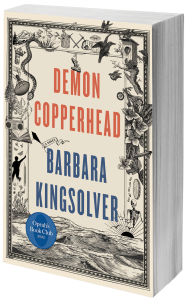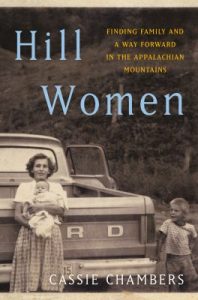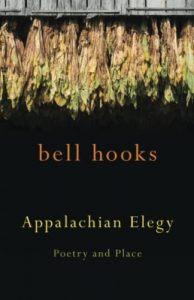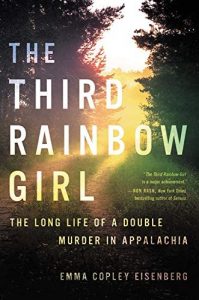While you wait for Demon Copperhead
 Barbara Kingsolver is one of my all-time favorite authors. Her compelling characters face challenges with grit and intelligence. Kingsolver explores themes of ecology, social justice and community. In her latest novel, Demon Copperhead, she draws inspiration from David Copperfield by Charles Dickens. A narrator looks back into the early 1990s to tell his story of coming up as a poor kid from Appalachia. Back then, Damon Fields was known by his nickname, Demon Copperhead. His story begins in a trailer park where he is raised by a single mom addicted to opioids. Like many children of addicted parents, he lacks a support net and ends up in the foster care system. Despite many barriers, Demon won’t give up. You will cheer him on as he struggles, falls on his face and gets up to fight again. Kingsolver was raised in Kentucky and now lives in rural Appalachia. As a biologist and resident, she knows the ecology and the people of the region intimately. Kingsolver has spoken out against the stereotypes popular media often perpetuates about her neighbors. She wrote Demon Copperhead to let a child tell the story of how the opioid crisis is ravaging lives, but also to show the strength and beauty of Appalachia. Check out these reads while you wait for your copy of Demon Copperhead, or if you’re looking for more powerful stories of Appalachia, the opioid crisis and characters who overcome the odds.
Barbara Kingsolver is one of my all-time favorite authors. Her compelling characters face challenges with grit and intelligence. Kingsolver explores themes of ecology, social justice and community. In her latest novel, Demon Copperhead, she draws inspiration from David Copperfield by Charles Dickens. A narrator looks back into the early 1990s to tell his story of coming up as a poor kid from Appalachia. Back then, Damon Fields was known by his nickname, Demon Copperhead. His story begins in a trailer park where he is raised by a single mom addicted to opioids. Like many children of addicted parents, he lacks a support net and ends up in the foster care system. Despite many barriers, Demon won’t give up. You will cheer him on as he struggles, falls on his face and gets up to fight again. Kingsolver was raised in Kentucky and now lives in rural Appalachia. As a biologist and resident, she knows the ecology and the people of the region intimately. Kingsolver has spoken out against the stereotypes popular media often perpetuates about her neighbors. She wrote Demon Copperhead to let a child tell the story of how the opioid crisis is ravaging lives, but also to show the strength and beauty of Appalachia. Check out these reads while you wait for your copy of Demon Copperhead, or if you’re looking for more powerful stories of Appalachia, the opioid crisis and characters who overcome the odds.
Hill Women by Cassie Chambers
 Kentucky native Cassie Chambers tells the true story of three generations of women in her family. Her grandmother found joy in her simple life despite deprivation. Her aunt pitched in to run the family farm, and her mother was the first person in her family to graduate from college. Chambers thanks these women for holding her up as she attended college and law school. When she finished her degrees Chambers returned to her home turf to provide legal services for people in poverty. Her memoir is a deeply personal story of family and perseverance. It's also a compassionate and hopeful look at an oft-stereotyped region.
Kentucky native Cassie Chambers tells the true story of three generations of women in her family. Her grandmother found joy in her simple life despite deprivation. Her aunt pitched in to run the family farm, and her mother was the first person in her family to graduate from college. Chambers thanks these women for holding her up as she attended college and law school. When she finished her degrees Chambers returned to her home turf to provide legal services for people in poverty. Her memoir is a deeply personal story of family and perseverance. It's also a compassionate and hopeful look at an oft-stereotyped region.Nothing Gold Can Stay by Ron Rash
 I recommend absolutely everything by Ron Rash if you want to read a strong voice from Appalachia. A variety of his work is available on Hoopla with no holds in ebook and digital audiobook. Rash writes vivid short stories, poetry and novels inspired by the beauty, darkness, history and hope of the Appalachian region. The first Rash book I read was Nothing Gold Can Stay, a collection of short stories. Every story in the collection struck me as strong and memorable, which is rare in a short story collection.
I recommend absolutely everything by Ron Rash if you want to read a strong voice from Appalachia. A variety of his work is available on Hoopla with no holds in ebook and digital audiobook. Rash writes vivid short stories, poetry and novels inspired by the beauty, darkness, history and hope of the Appalachian region. The first Rash book I read was Nothing Gold Can Stay, a collection of short stories. Every story in the collection struck me as strong and memorable, which is rare in a short story collection.
Appalachian Elegy by Bell Hooks
 This collection of poetry is unforgettable. I grabbed it while browsing at the library because the title and the poet's name caught my eye. After I read it I bought a copy for my own collection. Hooks was born and raised in Kentucky. She writes poetry, novels, essays and more with the flavor of her Appalachian heritage and lived experience. Topics include the environment, poverty, marginalization of people of color, family heritage and natural beauty. Check out a sample of her work from the Poetry Foundation and then read more from your library.
This collection of poetry is unforgettable. I grabbed it while browsing at the library because the title and the poet's name caught my eye. After I read it I bought a copy for my own collection. Hooks was born and raised in Kentucky. She writes poetry, novels, essays and more with the flavor of her Appalachian heritage and lived experience. Topics include the environment, poverty, marginalization of people of color, family heritage and natural beauty. Check out a sample of her work from the Poetry Foundation and then read more from your library.The Third Rainbow Girl by Emma Copley Eisenberg
 Try true crime for another perspective on the Appalachian region. The Third Rainbow Girl explores an unsolved murder in West Virginia in 1980, but it also looks at the history and feel of the region.
Try true crime for another perspective on the Appalachian region. The Third Rainbow Girl explores an unsolved murder in West Virginia in 1980, but it also looks at the history and feel of the region.From Publisher's Weekly: "In June 1980, 26-year-old Vicki Durian and 19-year-old Nancy Santomero were hitchhiking through rural West Virginia, heading to a festival called the Rainbow Gathering. They never made it. The story of their shooting murders, and the hunt for the killer, consumed the citizens of Pocahontas County for decades, as journalist Eisenberg reveals in this gripping account, her first book. She spent five years researching the crime and blends the case facts with a memoir of her time living in the area, playing bluegrass and drinking bourbon with men who were connected to the Rainbow Gathering.
"Part self-discovery and part crime and courtroom drama, the narrative follows two possible theories. Jacob Beard, a local farmer, was arrested 13 years after Durian and Santomero's deaths and was convicted of their murders, though witness statements were shaky and there was no physical evidence. But as Eisenberg notes, white supremacist Joseph Paul Franklin, a convicted serial killer, made a jailhouse confession before Beard's 1993 trial that he killed the young women, but the prosecutors dismissed it. The author herself thinks it was bogus. Not until 2000 did Beard get a second trial, at which he was acquitted, yet the community may never know the truth. This is essential reading for true crime fans."
The Book Woman of Troublesome Creek by Kim Michele Richardson
 I really enjoyed Richardson's story of horseback librarians in Kentucky during the 1930s. Richardson was inspired by a real program and real women who took risks to bring books and information to rural residents. The librarian in this story, Cussy Mary, is one of the Blue People of Kentucky, which I had not heard of until reading this book. Due to a genetic condition, the Blue People had a blue tinge to their skin that made them stand out among their neighbors. It led to isolation and fear. I'll bet you're intrigued, between horseback librarians and blue skin! Fortunately this one is available on Hoopla with no holds in ebook and digital audiobook. This year Richardson released a sequel, The Book Woman's Daughter, which you can check out in many formats.
I really enjoyed Richardson's story of horseback librarians in Kentucky during the 1930s. Richardson was inspired by a real program and real women who took risks to bring books and information to rural residents. The librarian in this story, Cussy Mary, is one of the Blue People of Kentucky, which I had not heard of until reading this book. Due to a genetic condition, the Blue People had a blue tinge to their skin that made them stand out among their neighbors. It led to isolation and fear. I'll bet you're intrigued, between horseback librarians and blue skin! Fortunately this one is available on Hoopla with no holds in ebook and digital audiobook. This year Richardson released a sequel, The Book Woman's Daughter, which you can check out in many formats.











